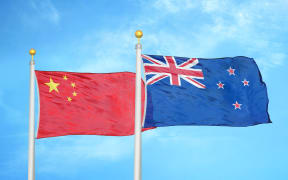
Beijing, China's capital city. The latest survey shows 37 percent of New Zealanders view China as a threat compared with 58 percent the previous year. Photo: Unsplash / Zhang Kaiyv
It is positive that New Zealanders now see Asia as an important region for the country to engage with, but more action is needed from governments, businesses, educators and individuals to translate that interest into efforts to learn more about the region, academics say.
The latest Perceptions of Asia and Asian Peoples (2022) survey shows close to two-thirds (65 percent) of New Zealanders believe it is more important for the country to invest energy and resources into building partnerships with Asian countries than it was five years ago.
Nearly four out of five respondents (79 percent) say both teaching students about Asia and offering Asian-language courses are at least somewhat important for New Zealand's education system, according to the annual survey conducted by the Asia New Zealand Foundation. Food, travel and commerce are New Zealanders' top Asia interests.
New Zealand Contemporary China Research Centre director and an associate professor at the Victoria University of Wellington, Jason Young, said factors affecting the growing interest included the changing makeup of the population, which allowed closer contact with Asian cultures; more people visiting Asia for education or business; viewing Asia as an important market for exports and business; and the region's growing global influence.
"That's a really positive sign, but the concern for me is that that hasn't translated into more people making an effort to learn Asian languages or to study more about those countries. ... Across the country, a number of universities are rolling out redundancies in Asian languages, and students are not choosing Asian languages," Young said.
"I think it's really concerning that we say it's important but we are not ... investing in it and encouraging people to study those subjects, either through scholarships, or students themselves are choosing to make these decisions because they think it's important for their future."
He said he understood learning foreign languages and culture could be hard, but not many people were ready "to do the hard yards to learn more about the place", noting that New Zealanders' response has often been "superficial".
"Secondly, there is not really much of a narrative either coming out of business or government that New Zealanders should be doing this because it's important for our future."
University of Auckland Business School New Zealand Asia Institute director Natasha Hamilton-Hart said she was delighted to see the numbers and it was "incredibly important" that New Zealand was educating its population more about Asia - and not just languages.
"Direct experience would be even better, but at least through the education system, to have an idea about what are the major countries' histories, their business systems, what kind of innovation systems they have and what economic development societies they are," Hamilton-Hart said. "There's so much we could do in terms of education."
However, not nearly enough has been done both at schools and universities, and things had even been moving in the opposite direction, she said.
"Some of the New Zealand universities are significantly reducing their Asian studies programmes and, in fact, over a longer time period over 20 years, I can say at the University of Auckland, we teach less about Asia now than we did 20 years ago, which is dreadful."
It was clear there was a social demand for education about Asia but the educational opportunities were not matching up, Hamilton-Hart said.
"Sometimes, people accuse us of being inward looking, not interested in the rest of the world, or still only looking towards the United Kingdom or the US English-speaking countries, and clearly that's not true.
"I think that our political leaders need to take note and and invest in developing more of an Asia capability for New Zealanders," she said. "Unfortunately that's even though they have acknowledged the importance of Asia for more than 20 years, we haven't actually made progress in becoming more Asia capable in that time, and that's a real worry."

Six manmade 'supertrees' tower over a tropical garden and raised walkway in Singapore. Photo: Rod Waddington / Flickr (CC BY-SA 2.0)
Views on China
More New Zealanders continued to see China as a threat (37 percent) rather then a friend (30 percent), but the 2022 survey results represented a warming of sentiment compared to the findings in the previous year, with 58 percent viewing China as a threat in 2021, according to the survey.
Hamilton-Hart said the results were not unexpected.
"Over the longer term, the perception of China as a threat has become more common among New Zealanders... In the last five years there's been a very clear cooling off of relations between China and the United States and an increase in tension and competition between them.
"Given the amount of news that we've had about China and the fact that China is a rising power, rising not just in economic importance but rising in military capacity and becoming more assertive internationally ... there's definitely a kind of power transition or change in the balance of power in Asia underway, so it's not surprising that a number of people see this as potentially threatening."
Young said Chinese Foreign Minister Wang Yi's visit to Pacific countries to sign a region-wide agreement covering security and trade has heightened the threat perception.
The survey showed that only 13 percent of the respondents thought China was acting responsibly as a major power, a slight increase of three percentage points from the 2021 survey. China ranked second to last among the nine major countries surveyed, with Russia sitting at the bottom (7 percent).
"It's very concerning from China's perspective to see that many New Zealanders had very little belief that China as an international actor would behave responsibly in world affairs," Young said.
Nearly two-thirds of New Zealanders (63 percent) were also concerned about potential military conflict over Taiwan, and Young said he expected that number to be higher, given the news coverage on tensions in recent years.
It was interesting that although a vast majority (72 percent) rated China as the most important Asian country for New Zealand's future, less than one-third (30 percent) saw China as friendly and trustworthy, but people viewed Japan (72 percent), Singapore (67 percent) and South Korea (54 percent) as the most trusted Asian partners, he said.
"One thing I would encourage would be some follow-up with the survey to understand why people answer questions in certain ways. ... Was it because China is an important international actor or was it more because China buys a lot of our exports? That has raised a lot of questions."





